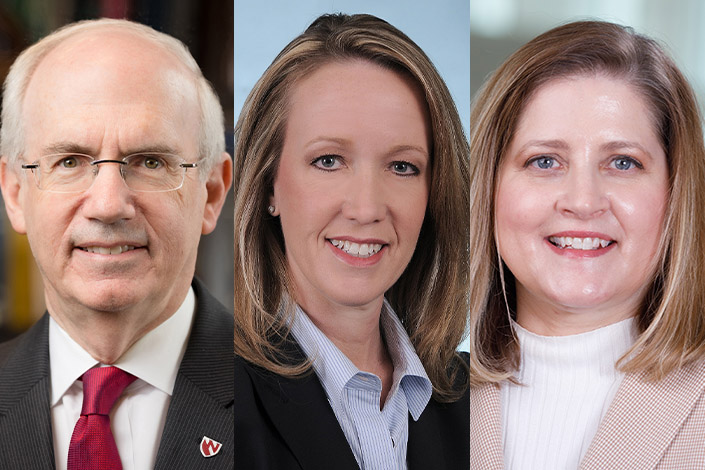Although remote work is not going away, the University of Nebraska’s alternative worksite policy is designed to both provide flexibility and bring people together on campus.
“The goal is to have more working in-person … but there’s not a ‘one size fits all,’” said Anne Barnes, UNMC’s vice chancellor for business, finance and business development. “Remote work will be, in some form or fashion, part of our future.”
Barnes joined UNMC Chancellor Jeffrey P. Gold, MD, at Monday’s all-campus forum to discuss the alternative worksite policy, announced by the University of Nebraska president in December.
Dr. Gold said there’s little question that being present on site is a beneficial thing. “That’s what the Office of the President is trying to stress in these policies. … We want reasonable flexibility while staying mission-centric.”
Staff members wishing to work remotely had to seek permission to do so by completing the alternative worksite form in Firefly by Jan. 31. Requests were submitted on the following basis:
- Individuals requesting to work remotely more than 50% of the time – on a regular, ongoing basis – must get approval from UNMC’s vice chancellor for business, finance and business development. Submitted forms are being reviewed now, Barnes, said, and, in some cases, clarifying questions are being asked.
- Individuals requesting to work remotely less than 50% of the time must get approval from their direct supervisor.
- Staff who work remotely only occasionally do not need to take any action.
ADA or religious accommodations are a separate matter, Barnes noted, and will not be addressed through the worksite policy. Instead, such requests must go through UNMC Human Resources.
The alterative worksite policy also addresses employment for staff members who work outside Nebraska. Under NU’s new policy, employees may work from states where tax and employment laws are comparable to Nebraska’s. (Yes, Iowa is a comparable state). Barnes said the small number of employees who work in states where tax and employment laws are not comparable with Nebraska’s soon will receive additional communication from Human Resources on their options and next steps. Changes for these individuals won’t take effect until January 2024.
At this time, the worksite policy applies only to staff, Barnes said. However, discussions are underway to look at state employment laws regarding faculty.
Members of the medical center community can view the forum.
Jane Meza, PhD, interim executive director for the UNMC Office of Health Security, said UNMC continues to monitor COVID-19 data, but noted that hospitalizations and case fatality numbers are most meaningful. Case counts, she said, are misleading because of increased numbers of home tests and unreported testing. Still, she said, bivalent boosters continue to protect individuals effectively from XBB.1.5, the latest COVID-19 variant.
Dr. Gold agreed: “There’s little question that bivalent boosters are still quite effective and enhance immunity and suppress serious illness, hospitalization and death rates due to COVID.”
Although not required, individuals may record their bivalent boosters in the Health Tracking System if they wish, Dr. Meza said. UNMC requires faculty, staff and students only to have received the primary COVID-19 vaccine series.
In other matters, Dr. Gold noted:
- UNMC’s draft strategic planning document soon will be made available for input. The draft, once released, will reflect recommendations from working groups that looked at both the campus culture survey and IT challenges and opportunities in education and research.
- Victor Dzau, MD, president of the National Academy of Medicine, will present at UNMC’s upcoming Breakthrough Thinking Series on March 6. Dr. Dzau will discuss “Combatting Clinician Burnout and Activating a National Movement to Optimize Well-Being,” from 11 a.m. to noon CT via Zoom.
- The 2024-2026 NU systemwide and campus budget models are being developed. Dr. Gold stressed how important all enrollment, research and clinical continued growth are to the future of UNMC and to minimize reallocations over the next biennium.
- Searches continue for a new nursing dean (finalists were on campus in January) and a new dentistry dean (finalists will be announced soon). A search firm has been identified to assist UNMC in finding a new director of the Fred & Pamela Buffett Cancer Center and the Eppley Institute for Research in Cancer.
- David Doty will join UNMC on April 3 as the new Sponsored Programs Administration director. Doty has led the office of sponsored programs at the University of Nebraska-Lincoln since November 2019.
- The NU Board of Regents approved a request for a 3% increase per year for each year of the biennium in state supported funds; Gov. Jim Pillen’s initial budget recommendation included a 2% increase, Dr. Gold said. In response to questions, he indicated that the Regents, this week, will be asked to review and act on collective bargaining requests at 3% for faculty at the University of Nebraska at Omaha and University of Nebraska at Kearney campuses.
- The Behavioral Health Education Center of Nebraska has announced awards of nearly $20 million in American Rescue Plan Act funding to 83 Nebraska projects. The funds will help develop, recruit and retain Nebraska’s behavioral health workforce with more than half of the awards allocated to rural providers or organizations.
- Work continues on the Saddle Creek redevelopment project, including the Catalyst Innovation Hub. Discussions are underway to see whether the administrative tower project might be able to address current critically important research expansion needs.
In closing, Dr. Gold once more stressed the importance of wellness and resilience and urged the campus community to extend grace and care to one other and seek support services, as needed. “I appreciate each of you and wish all of the UNMC family continued health, happiness and success,” he said.
